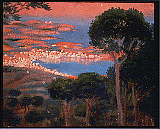The term Victorian literally describes things and events in the reign of Queen Victoria (1837-1901). It conveyed connotations of "prudish", "repressed", and "old fashioned."
But popular ideas about the Victorians and attitudes toward their age change as it recedes into the past. Modern writers who were trying to free themselves from the massive embrace of their predecessors often saw the Victorians chiefly as repressed, over-confident, and thoroughly philistine.
(http://www.stg.brown.edu/projects/hypertext/victorian/un/victorov.4.html)
Robert Furneaux Jordan points out that popular notions of life as cosy and picturesque hardly fit the hurly-burly of Victorian reality. That earnest world of tractarian parsons and Oxford common-rooms, that world of Hardy´s peasants buried deep in English shires, did really exist. Of course it did. But it was not very important.
By and large, Victorian England was a tremendously virile and terrible affair. If we strip away the gadgets and fashions, Victorian England was not unlike the United States today. There was the same unblinking worship of independence and of hard cash; there was the same belief in institutions (patriotism, democracy, individualism, organized religion, philanthropy, sexual morality, the family, capitalism and progress); the same overwhelming self-confidence. And, at the core, was the same tiny abscess- the nagging guilt as to the inherent contradiction- between the morality and the system.
(http://www.stg.brown.edu/projects/hypertext/landow/victorian/un/victorov.html)
